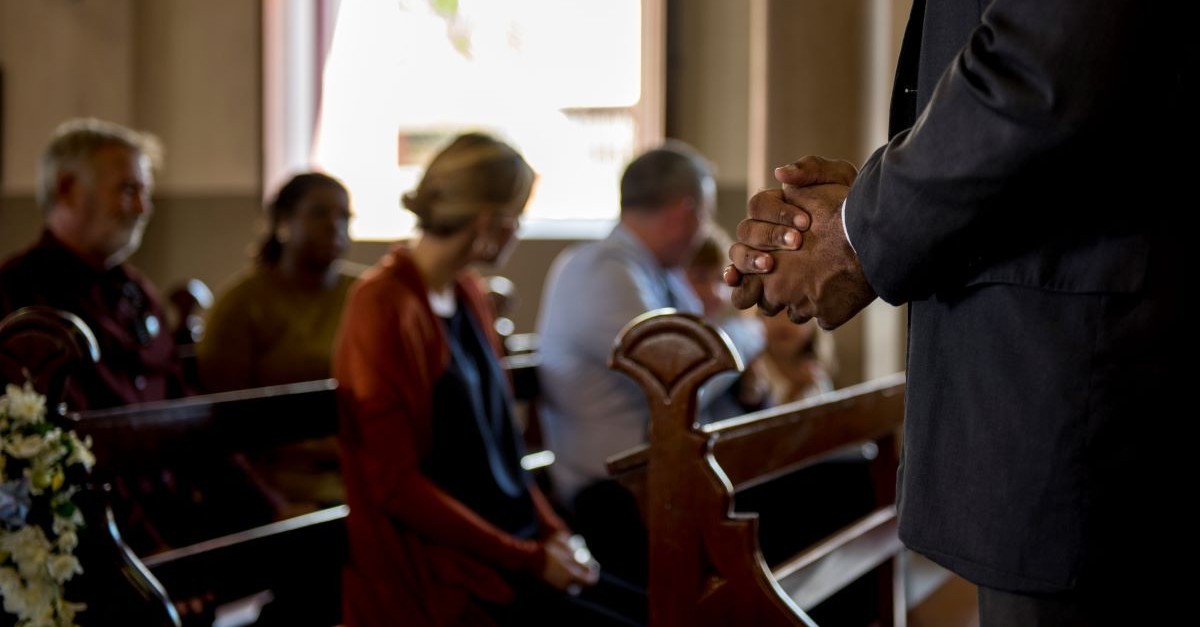
The Bible instructs us about the need to gather as the family of God (Hebrews 10:25). When we do, we encourage one another through the Word of God (1 Timothy 4:13) and teach one another through praise and worship—hymns, psalms, and spiritual songs (Ephesians 5:19).
We know we should prioritize this, yet in our busy lives, it can be difficult to engage fully. Jobs keep us busy and overwhelmed, and families bring drama and crises. Engaging in corporate worship seems boring compared to other entertainment or "fun" events.
As with any part of walking with God, we must be intentional and disciplined about the things that are important. God acts with purpose from truth, and he leads us to do the same. We go to church not because it's fun in the immediate but because of the good it does us in the long term, both in this life and the next.
Here are seven ways to be fully present in church worship.

1. Pray Beforehand
One powerful way to be fully present is to pray for the service before you go, aligning your heart and mind with God's purposes for the gathering. In Matthew 18:20, Jesus assures, "For where two or three gather in my name, there am I with them." Preparing through prayer invites God's presence and cultivates an attitude of reverence and expectation.
Before heading to church, take a moment to connect with God in prayer, seeking his guidance, blessing, and anointing upon the service. Offer prayers for the worship leaders, pastors, and volunteers, asking for God's empowerment and wisdom as they lead the congregation in praise and teaching.
In your prayer, express gratitude for the opportunity to gather with fellow believers and worship the Lord corporately, especially keeping in mind cultures where governments try to keep believers from gathering. Humbly submit yourself to God's leading, inviting the Holy Spirit to work in hearts and minds, convicting, comforting, and transforming lives. There may be people there who need to hear the Gospel. Lift them up in the love and power of God to change hearts and minds.
By praying for the service beforehand, you actively participate in the spiritual preparation of the gathering, contributing to a conducive atmosphere for encountering God and experiencing His glory in worship.
Photo credit: ©Getty Images/Krisanapong Detraphiphat

2. Arrive Expectantly
While we worship together, God seeks to speak to each person, including you. Arrive at the service expecting to hear from the Holy Spirit. This is a crucial way to be fully present, fostering an atmosphere of receptivity and anticipation for divine revelation.
In Acts 2:1-4, we witness the disciples gathered in one place, eagerly awaiting the promised Holy Spirit, who descended upon them with power and tongues of fire. This biblical event underscores the importance of expecting God's presence and guidance in corporate worship.
We don't serve a deaf or dumb god, one who has no power to speak or move. On the contrary, Yahweh is the only one able to do good and mighty works. As you journey to church, recognize that God desires to speak to his people through his Spirit and his people. Approach the service with an open heart and mind, ready to receive the prompting, conviction, comfort, or guidance of the Holy Spirit.
Upon arrival, take a moment to quiet your soul and tune into the spiritual atmosphere. Pray for a sensitive spirit to discern the leading of the Holy Spirit throughout the service, acknowledging His sovereignty and authority. Be willing to step out in faith if prompted to respond in prayer, praise, or obedience.
Photo credit: ©GettyImages/Rawpixel

3. Arrive Early
When we arrive late, we become more stressed and distracted, and it requires more effort to engage with the worship and teaching. Arriving early, rather than late, is a vital way to be fully present, ensuring a smooth transition into a mindset of reverence and readiness to engage with God and fellow believers. In Psalm 95:6, the Psalmist implores, "Come, let us bow down in worship, let us kneel before the Lord our Maker."
By arriving early, you demonstrate respect for the sanctity of the worship experience and the community gathered. It allows you time to settle in, both physically and mentally, minimizing distractions and creating a conducive environment for focused worship.
Arriving early also provides opportunities for personal preparation, such as prayer, reflection, and meditation, enabling you to align your heart with God's presence and purposes for the service. It sets a tone of anticipation and expectation, signaling your eagerness to participate actively and wholeheartedly in worship.
In addition, this allows you to engage in meaningful interactions with fellow worshippers, fostering a sense of unity, fellowship, and encouragement within the Body of Christ. It provides opportunities to greet and connect with others, building relationships and a sense of community.
On a practical level, arriving early demonstrates good stewardship of time and resources, honoring the commitment of worship leaders, volunteers, and fellow worshippers who have diligently prepared for the service.
Photo Credit:©GettyImages/Bobex-73

4. Put Phones Away
People take their phones everywhere and check them for hours a day. As much as our smartphones can be great tools for communication and productivity, they also provide an easy way to be distracted. Putting phones and other distractions away allows for undivided focus on encountering God and engaging in meaningful fellowship with fellow believers. In Matthew 6:33, Jesus instructs, "But seek first his kingdom and his righteousness, and all these things will be given to you as well." This directive emphasizes the importance of prioritizing God's presence above worldly distractions.
By consciously putting away phones and other distractions, you demonstrate a commitment to honoring the sanctity of the worship experience and creating an environment conducive to encountering God's presence. It signifies a willingness to set aside worldly concerns and preoccupations in order to center attention on worshipping God wholeheartedly. Whatever is on the phone can wait. God deserves our complete attention.
Eliminating distractions creates a space where you can hear from God, respond to His prompting, and participate actively in the corporate worship experience. Putting away phones and other distractions also fosters a culture of respect and reverence within the church community, honoring the sacredness of the worship gathering and showing consideration for fellow worshippers.
Moreover, removing distractions encourages authentic connections and interactions with others, promoting a sense of unity and fellowship among believers. It provides opportunities for meaningful conversations, mutual encouragement, and support within the Body of Christ.

5. Engage Physically
Engaging physically, such as singing, raising hands, and standing, is a powerful way to be fully present in church worship, expressing reverence, adoration, and surrender to God. In Psalm 47:1, the psalmist declares, "Clap your hands, all you nations; shout to God with cries of joy." This illustrates the biblical precedent for physical expressions of worship in the Old Testament. Now, in the New Covenant, with the fullness of Christ, we have even more joy in him.
Singing engages the heart, mind, and soul, allowing worshippers to express their love for God and declare his greatness with fervor and authenticity. Raising hands in worship symbolizes surrender, submission, and openness to God's presence and leading. It signifies a posture of humility and receptivity, acknowledging God's sovereignty and inviting his divine touch into one's life.
Standing during worship signifies reverence, respect, and attentiveness to God's presence. It symbolizes readiness to receive from God and respond to his leading with obedience and faithfulness. David, a man after God's own heart, also danced with all his might before God. Dancing expresses joy at the amazing work of God. Dancing proves a great option for younger kids who can't read the words yet on the screen and may not know the songs.
Not everyone may be physically able to engage, but all are able to act out worship in some way.

6. Listen Attentively
Beginning with Moses and the giving of the law, teaching and preaching the Word of God has been a central part of gathering the people of God. Listening attentively to the sermon is an important way to be fully present in church worship, allowing you to receive God's Word with openness, receptivity, and a desire for transformation. In James 1:22, believers are urged, "Do not merely listen to the Word, and so deceive yourselves. Do what it says." Once hearing the Word, we are responsible for responding in obedience. The precious and treasured Word of God should be listened to and applied to life.
Jesus often said, "He who has ears to hear, let him hear" (Matthew 11:15). This teaches how if we've been given the ability to hear the Word of God, we should be active in participating, listening, and applying.
Attentive listening involves focusing on the message being delivered and seeking understanding and insight into God's truth, demonstrating reverence for God's Word and a hunger for spiritual growth and maturity. You recognize the sermon as a means through which God speaks directly to his people, offering guidance, wisdom, and encouragement for living a life that honors him.
Attentive listening also fosters a deeper connection with the preacher or pastor, acknowledging their role as messengers of God's truth and authority in the church. It encourages respect for their insights, teachings, and pastoral care and promotes a culture of mutual edification and discipleship within the Body of Christ.

7. Engage with Fellow Believers
The gathering of the saints isn't simply for singing and listening to the Word. We gather with family; a healthy family shows love and encourages one another.
Engaging meaningfully with fellow believers is a vital way to be fully present in church worship, fostering a sense of community, unity, and mutual support within the Body. Hebrews 10:24-25 teaches, "And let us consider how we may spur one another on toward love and good deeds, not giving up meeting together, as some are in the habit of doing, but encouraging one another—and all the more as you see the Day approaching." According to Hebrews, written almost two thousand years ago, we should be gathering even more as the Day of Judgment approaches. We may not know when that day is, but it's closer now than it was then.
Meaningful engagement involves genuine interactions, intentional conversations, and acts of love and kindness. It requires openness, vulnerability, and a willingness to share life's joys and struggles with one another, not simply small talk. This creates a supportive and nurturing environment, fostering unity and solidarity. In addition, knowing others care promotes a culture of acceptance and belonging, celebrating the unity and diversity of the Body of Christ.
This engagement extends beyond the church walls to acts of service and outreach to the local community, united in purpose and mission to proclaim the Gospel and make disciples of all nations.
As a former missionary, I've traveled to several different countries. While in India, where believers are persecuted for their faith, people traveled all day to gather with other Christians to sing praises to God and hear the truth of Christ spoken. Never again will I take for granted the opportunity to serve and get together with the Body of Christ, whether in a church building, a house, or a park.
Even recently, through COVID lockdowns and churches closing for weeks or months, Christians should be even more thankful and intentional about taking advantage of the sacred and powerful opportunity to worship with our brothers and sisters in Christ.
Photo credit: ©Getty Images/Thomas Barwick

Originally published Friday, 12 April 2024.
